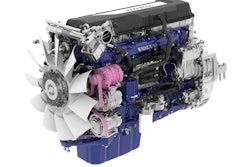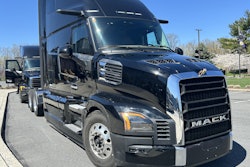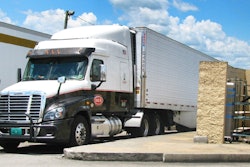Trucking news and briefs for Wednesday, April 30, 2025:
House Transportation budget proposal would create new carrier authorization confirmation website
As House Republicans this week begin the budget reconciliation process, the House Transportation & Infrastructure Committee has published its proposal that calls for a public website to confirm motor carriers’ operating authority, a requirement for electric vehicles to pay into the Highway Trust Fund and other measures.
“With this proposal, the Committee is doing its part to ensure that Republicans fulfill our promise to the American people and the promise of the President’s America First agenda,” said Committee Chairman Sam Graves (R-Missouri).
Budget reconciliation is an expedited process Congress can use to make legislation easier to pass in the Senate by requiring a simple majority vote rather than needing 60 votes. During the reconciliation process, certain committees are instructed to submit recommendations for spending and/or revenue changes to the Budget Committee, where separate proposals are packaged together into one bill.
The T&I Committee’s proposal would allocate $5 million to the Federal Motor Carrier Safety Administration to establish a public website that provides information on motor carriers “in a manner that indicates whether each motor carrier meets or does not meet all [FMCSA] operating requirements.”
For each carrier, the site would display one of two statements:
- “This motor carrier meets Federal Motor Carrier Safety Administration operating requirements and is authorized to operate on the nation’s roadways.”
- “This motor carrier does not meet Federal Motor Carrier Safety Administration operating requirements and is not authorized to operate on the nation’s roadways.”
The provision also would require an annual $100 fee for each person seeking access to the website.
According to the T&I proposal, any “broker, freight forwarder, or household goods freight forwarder” that uses the site to ensure the carrier they’re working with “meets Federal Motor Carrier Safety Administration operating requirements shall be considered to have taken reasonable and prudent determinations in engaging such motor carrier.”
T&I's proposal also includes provisions for investments into the U.S. Coast Guard, America’s air traffic control system and other transport sectors. It also proposes to rescind certain Inflation Reduction Act funding programs and proposes to require owners of electric vehicles to begin paying into the Highway Trust Fund through increased registration fees, given EVs don’t pay fuel taxes like regular vehicles. Electric farm vehicles and commercial motor vehicles generally are excluded from that provision.
T&I is slated to hold its markup on the proposal Wednesday, April 30. Should the trucking-related provision remain in the bill, it will need to survive both a full House and Senate vote to become a reality.
[Related: Electric vehicles' lack of fuel tax leaves highway funding in limbo]
Plus achieves milestone with driverless safety maneuver testing
Autonomous trucking AI software developer Plus announced this week the latest milestone in its commercialization plan -- its virtual driver, SuperDrive, recently completed validation tests of fully autonomous operations and handling of advanced safety maneuvers with no person in the truck.
Shown on a closed test track, the breakthrough highlights how Plus is continuously enhancing the safety, reliability and maturity of its AI-based self-driving software as it prepares for the commercial launch of factory-built driverless trucks integrated with SuperDrive, the company said.
The validation of a SuperDrive truck with fully redundant sensors and computers is a major milestone on the roadmap to start factory production of driverless trucks, Plus noted. SuperDrive operated the truck without a human driver in the cabin or remote intervention. The driverless truck relied entirely on Plus’s self-driving technology to make complex real-time driving decisions.
SuperDrive is also trained using end-to-end AI models to dynamically handle unexpected situations where it is no longer safe for the truck to continue on the road. SuperDrive’s Autonomous Fallback System (AFS) is designed to ensure that the hardware and software in the self-driving system are resilient and capable at all times.
Plus said its repeated driverless tests validated that once the AFS identifies and confirms an issue, such as a sensor failure, software module fault, or road closure, it reliably directs SuperDrive to the safest path, whether that is to come to a slow stop in its lane or to pull over to the side and stop the vehicle.
“Autonomous trucks are among the most transformational applications of Physical AI,” said David Liu, CEO and Co-founder at Plus. “When it comes to launching driverless trucks commercially, it is critical for our self-driving software to be able to handle the expected and unexpected complexities of driving and interacting with the physical world. Safety is and always will be a priority at all times. We are taking deliberate steps to test, validate and deliver safe and scalable factory-built autonomous trucks with SuperDrive that meet the rigorous demands of the freight industry.”
Plus added that it has accumulated more than 5 million miles of real-world driving using its autonomous driving system. Public road testing is underway in Texas and Sweden as part of its development and preparation for the commercial launch of SuperDrive. For safe and scalable deployment, Plus has partnered with the world’s largest truck makers including Traton Group’s Scania, MAN, and International brands, Hyundai, and Iveco to bring factory-built driverless trucks to Europe and the U.S. Plus is also partnering with Tier IV to launch driverless trucks in Japan to address the country’s critical driver shortage.
High school’s petition to allow 17-year-old CLP holders denied
The Federal Motor Carrier Safety Administration has denied an exemption request from a high school in Washington state that sought to allow 17-year-olds to obtain commercial learner’s permits (CLPs).
Last year, Connell High School in Connell, Washington, which offers a CDL program for students, petitioned FMCSA for the exemption to allow students enrolled in its CDL Training Program to obtain a CLP at the age of 17. The program would span two semesters (one full school year) and provide 180 hours of classroom, field, and drive time training.
In its request, the high school said that it believed the exemption would allow students to obtain a CDL at 18 and, upon graduation, “immediately enter the local workforce with stable, well-paying employment.”
FMCSA received 32 comments on the request with 17 opposed and 15 supporting. “All of the supporting comments were from individuals,” FMCSA noted. “Of the comments in support, a majority believed that individuals in the program would be successful with the proper training.”
Of the 17 comments opposing the request, two were from trucking companies. Most of the commentary in opposition felt “the students were too young and lacked the appropriate experience to operate a CMV,” FMCSA said.
In denying the request, FMCSA said that based on the information provided by the school and commenters, it did not have enough information to determine if granting the exemption would “achieve a level of safety equivalent to, or greater than, the level obtained by complying with the regulation.”
FMCSA denies ELDT regs waiver for prospective driver trainer
A prospective CDL training instructor’s exemption request from certain provisions of FMCSA’s Entry-Level Driver Training (ELDT) regulations has been denied.
Albert Farley Jr. in December requested an exemption from the requirement that instructors have at least two years of driving experience of the same or higher class and/or the same endorsement level as the CMV to be operated to satisfy the instructor requirements under the ELDT regulations.
FMCSA acknowledged that Farley wants to be a behind-the-wheel CMV instructor for students seeking Class A CDLs, but noted that even though he held a Class B CDL and operated Class B CMVs “for many years, he does not have two years of experience operating Class A vehicles.”
“The Agency firmly believes that allowing an individual instructor to provide ELDT without the required driving experience could lead to similar exemption requests on a widespread basis,” FMCSA added. “Such a result would be inconsistent with a primary goal of the ELDT regulations, which was to improve highway safety by establishing a uniform Federal minimum ELDT standard.”












